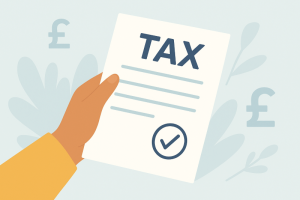💷 Paying a Loved One’s Final Taxes (UK Edition)
When someone dies, their tax responsibilities don’t disappear — but you’re not personally liable for paying them.
If you’re an executor or administrator, it’s your duty to make sure all final taxes are settled from the estate’s funds before distributing any inheritance.
This guide explains the different types of final taxes, who pays them, deadlines to know, and when to seek help.
🌱 At a glance
- Executors pay taxes from the estate, not from their own money
- You may need to settle:
- Income Tax (for earnings, pensions, or self-employment)
- Inheritance Tax (IHT) (if the estate is over the threshold)
- Capital Gains Tax (CGT) (if assets are sold at a profit)
- Inheritance Tax must usually be paid before probate is granted
- Executors can be held responsible if taxes aren’t paid before distributing assets
✅ Who pays the taxes after someone dies?
As executor or administrator:
- You are responsible for reporting and paying any outstanding tax from the estate
- You are not personally liable (unless you distribute assets before tax is settled)
💡 Always complete tax obligations before distributing inheritance to avoid personal liability.
📄 Types of final taxes in the UK
1) Income Tax
If the person was employed, self-employed, or receiving pensions:
- Notify HMRC using Tell Us Once (or form R27)
- File a final tax return if they were self-assessed
- Pay any outstanding tax (or reclaim refunds if they overpaid)
💡 HMRC will issue a final calculation once everything is processed.
2) Inheritance Tax (IHT)
- Applies if the estate is worth more than £325,000 (nil-rate band)
- Or £500,000 if the home is left to children or grandchildren
- Must usually be paid before probate is granted
- Paid from estate funds, not by family personally
💡 Even if no IHT is due, you still need to complete forms such as IHT205 or IHT400.
3) Capital Gains Tax (CGT)
CGT may apply if:
- Assets (property, shares, investments) are sold for more than their probate value
Executors can use the estate’s annual CGT allowance (£3,000 for 2024/25).
🕒 Deadlines to know
| Tax type | Deadline |
|---|---|
| Inheritance Tax | Within 6 months of death |
| Income Tax | By 31 January (if self-assessment applies) |
| Capital Gains Tax | Within 60 days of sale |
⚠️ HMRC charges interest on late payments — it’s important to act on time.
💼 Do you need a solicitor or accountant?
Not always. Many estates can be managed without professional help.
But it’s wise to seek support if:
- The estate includes overseas assets, trusts, or business interests
- You’re unsure how to calculate IHT or CGT
- There are disputes among beneficiaries
💡 Professional support can reduce stress, errors, and delays.
